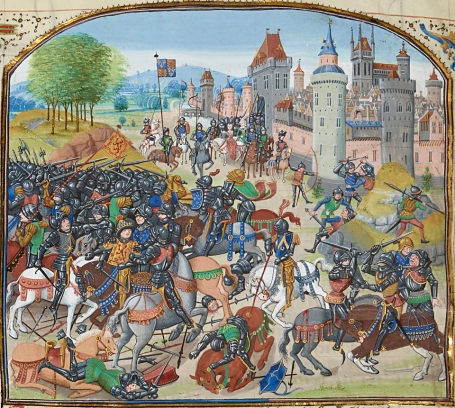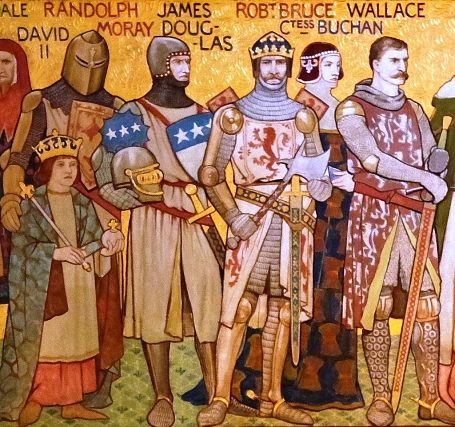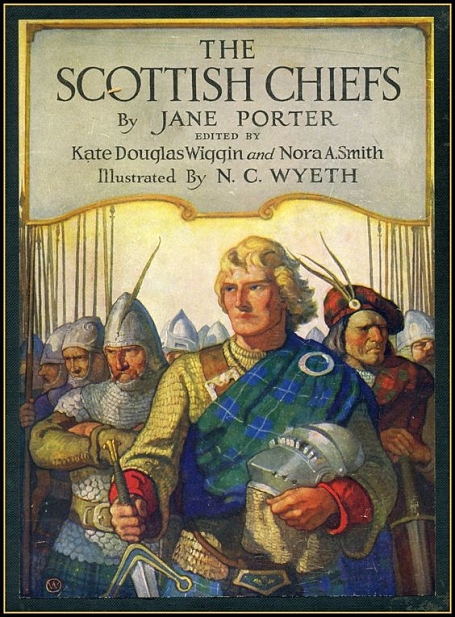The Life and Heroick Actions of the Renoun'd Sir William Wallace,
General and Governour of Scotland
by William Hamilton of Gilbertfield
Book XII, Chapter V
The Siege of St. JOHNSTOUN.
Wallace the Town does here besiege, in short,
And keeps a sturdy Guard at ev'ry Port.
Where Bishop Sinclair came to him on Sight,
With cliver Lads from Bute, all young and tight.
Lindsay and Boyd, who did him ne'er beguile,
From Arran came and from the Rauchly Isle,
As did the Barron bold of great Renown,
Brave Adam Wallace, then of Riccartoun.
In all the Road no Enemy durst be,
Some fled away by Land, and some by Sea.
Seaton and Lauder, and good Lundie now,
Came in a Barge to his Assistance too.
And in the Haven did their Anchors cast,
Where they Two English Ships secured fast.
The one they burnt, the other load'ned well,
With Warlike stores and sturdy Men in Steel.
To watch the Port, they strictly were oblig'd,
That Men nor Victuals pass to the besieg'd.
From South to North, the flying South'ron mourn,
Some left their Lives, in Pledge they would return.
The South'ron Bishop that fled from Dunkel,
To London rode and told all that befel.
Edward, he sends for Aymer Vallange now,
And asks at him what he thought best to do.
Who, like a Traitor, answer'd and said,
"Doubtless, he by a Friend must be betray'd:
Or by some of his Bon-Companions sold,
Who have best liking to the English Gold.
For which I shall my self to Scotland go,
And try the Treason, whither Yea or No."
King Edward therefore sign'd to him a Band
That he would ratify and and firmly stand,
To whatsoever Bargain he would make,
This Vallange does the Treason undertake.
To Scotland comes, at Bothwel did arrive
To execute the Plot he did contrive.
Unto Sir John Monteith express did send,
To come and speak with him at Rutherglen.
Who, when he came, disclosed all his Mind,
And laid before Sir John the whole Design.
"I know," said he "that you no Stranger are,
Unto the News of this new bloody War,
Which, if it be not soon put to a Stand,
Will prove destructive to our native Land.
Nothing but Blood and Rapine we can see,
Which will our great Misfortune always be,
So long as Wallace lives, who late and air,
Insults King Edward boldly every where.
The Country thus harrass'd on every Hand,
There's neither Trade nor Culture in our Land.
Now, good Sir John, if you'll advised be,
To take a Wholesome Counsel once from me,
It's in your Power to be an Earl now,
And to do service to your Country too.
I know you are for certain one of those,
In whom Sir William Wallace does repose
Great Trust and Confidence in each respect,
O would you then but grip him by the Neck.
As Lords and Earls we might live and reign,
Under King Edward, our most gracious King."
"Fy!" said Monteith, "It were a mighty Shame!
Yea, you, and I, shall both be much to blame,
If we betray a Man, who late and soon,
To King and Country hath such service done.
He's of our Nation, and our Forces all,
Both Governour, and Captain General.
For my part I declare, come Well or Wo,
I'll never condescend to treat him so."
Vallange reply'd, "If you but understood,
How great a shedder he's of Christian Blood,
You would not plead for him so much, I'm sure,
But rather contribute to break his Pow'r.
Besides, the King, could he but end the Strife,
Has no Design to take away his Life,
But to confine him so as make him cease
From War and not disturb the Common Peace."
This put Monteith unto a little stand,
Who wish'd that Wallace were in Edward's Hand,
Providing always he his Life would spare,
And make all good that Vallange promis'd there.
When Vallange saw Monteith thus in a muse,
Most cunningly his little Time did use,
Then in a Moment down he quickly told,
Three Thousand Pound of finest English Gold.
"This you shall have, and Lennox at your Will,
If you the King's desire will now fulfill."
Then he who was brave Wallace Friend before,
The strong Temptation could resist no more,
But did resign his Honour, and himself,
To Act the Treason, for the love of Pelf.
Receiv'd the Gold and then was strictly bound,
To carry Wallace safe to English Gound.
And there to put him in the South'ron's Hand,
For which he should be Lord of Lennox Land.
This Vallange promis'd to him without fail,
Sign'd and confirm'd it with King Edward's Seal.
Thus part the Villains, Wallace Mortal Foes,
And Aymer Vallange straight to London goes.
The cursed Tydings he did quickly bring,
Of his good Success to the English King.
The Contract shows, told every Thing that pass'd,
And did obtain his gracious Thanks at last;
Which Melancholy Story makes me mourn,
But to St. Johnstoun Siege I now return,
Where Wallace lay besieging all that Time,
Not dreaming of the Treasonable Crime.
The ballad, The Life and Heroick Actions of the Renoun'd Sir William Wallace, General and Governour of Scotland, by William Hamilton of Gilbertfield, 1722, is in the public domain.

The Kingdom of England and the Kingdom of Scotland fought dozens of battles with each other. They fought typically over land, particularly Berwick-Upon-Tweed, and the Anglo-Scottish border frequently changed as a result. Read more at Wikipedia.

The First War of Scottish Independence was the initial chapter of engagements in a series of warring periods between English and Scottish forces lasting from the invasion by England in 1296 ... Read more at Wikipedia.

Digitized version of The Scottish Chiefs, by Jane Porter, a novelization published in 1921 by Charles Scribner's Sons, about William Wallace and the First Scottish War of Independence. Read online at archive.org.